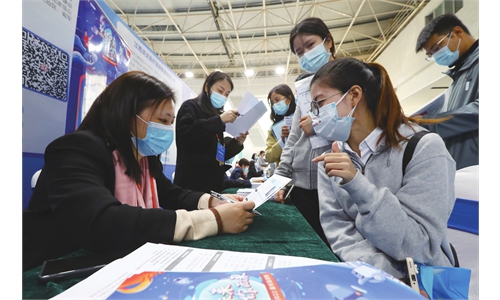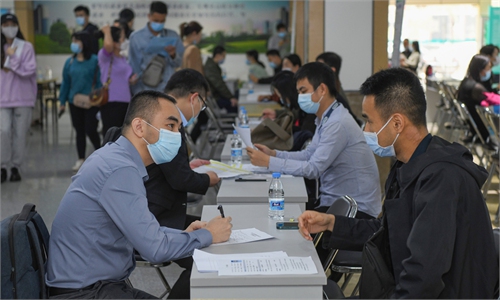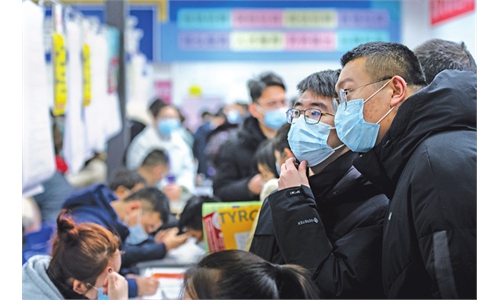Xi stresses support for employment of college graduates, development of private sector in tour to Sichuan

Chinese President Xi Jinping, also general secretary of the Communist Party of China Central Committee and chairman of the Central Military Commission, waves to villagers while visiting the village of Yongfeng to learn about local efforts in advancing high-standard farmland development, boosting grain production, promoting rural revitalization, maintaining effective COVID-19 prevention and control, in Meishan, Southwest China's Sichuan Province, June 8, 2022. Photo: Xinhua/Xie Huanchi
During an inspection tour in Southwest China's Sichuan Province on Wednesday, President Xi Jinping stressed the need to adhere to the dynamic zero-COVID strategy of containing the virus while ensuring economic development, called for more effective measures to tackle specific issues such as employment for college graduates and boosted morale by pointing to the bright path ahead.
The President's remarks came as China's two megacities - Beijing and Shanghai - have recently put the Omicron variant under effective control, while the economic recovery picks up pace despite challenges. Highlighting the country's focus on tackling specific challenges during the tour, Xi spoke to students at Yibin University and met with workers at a local tech firm, offering encouraging words and reaffirming the government's support.
Xi called for efficiently coordinating COVID-19 containment with economic and social development during an inspection to Southwest China's Sichuan Province on Wednesday, in the latest official effort to overcome challenges confronting the world's second largest economy.
Among the key takeaways from the top leader's remarks are fostering employment for college graduates, development of the private sector and local innovation, according to the Xinhua News Agency.
Reckoning the recent remarks as pertinent for an economy charting new territories in the haze of the domestic Omicron outbreak and complicated geopolitical tensions, economists are upbeat about the Chinese economy's agility and resilience in the second half of the year.
Xi went to the cities of Meishan and Yibin in Sichuan on Wednesday, visiting a village, a cultural relic protection site, a university and a company.
During the inspection, Xi said all localities and departments must strive to maintain a stable and healthy economic environment, a stable social environment and a clean political environment.
Xi called for efficiently coordinating COVID-19 prevention and control with economic and social development, and resolutely overcoming challenges currently faced in economic development.
Xi highlighted key areas, including employment, social security and aid for people living in difficulties.
The country's dynamic zero-COVID approach must be unswervingly upheld, Xi emphasized, ordering meticulous and solid work in key areas of COVID-19 response to consolidate the country's hard-won achievements in reining in the coronavirus.
The issue of college graduates employment is an important part of the top leader's remarks.
The country is expected to see about 10.76 million new college graduates this year, an increase of 1.67 million from the year before and the highest on record.
Caring a lot about college graduates entering the job market, Xi inspected Yibin University where he learned from teachers, students and business executives about corporate recruitment needs and the percentage of graduates signing job contracts.
The Party's Central Committee attaches high important to the employment of college graduates and has taken a raft of policy measures, Xi noted, urging efforts to explore job resources and provide practical and detailed employment guidance services.
Families who have been lifted out of poverty, families with subsistence allowances or no employment, college graduates with disabilities and those have been unemployed for a long time will be the focus of the pro-employment push.
In a sign of grim employment prospects, a new survey by Zhilian Zhaopin, a major job recruitment site in China, revealed that slightly over half of this year's college graduates opted to look for a job.
Among the 2022 new college graduates, 50.4 percent opted for signing in for a job contract, down 6 percentage points from last year, while those planning freelance business numbered 18.6 percent and those looking for slow employment hit 15.9 percent, both up 3 percentage points from the year before, according to the survey results.
This is the second year in a row with a decline in those choosing a work contract versus a rise in those opting for freelance work or slow employment.
As varied uncertainties roiled the economy and consequently weighted on the job market, taming unemployment is arguably a high priority on the government's agenda, Tian Yun, a Beijing-based economist, told the Global Times on Thursday, calling attention to an increase in the surveyed urban unemployment rate.
In April alone, the country's surveyed urban unemployment rate tallied 6.1 percent, up 0.3 percentage points from March. The surveyed unemployment rate in 31 major cities came in at 6.7 percent in April, according to official data.
The country aims to create over 11 million new urban jobs and keep an urban unemployment rate at no more than 5.5 percent in 2022, according to the annual government work report.
Sichuan is a major source of labor. Under the severe situation of employment in southeast coastal provinces, there may be flow back of labor to Sichuan. Therefore, the province needs to make preparations in advance, Hu Qimu, chief research fellow at the Sinosteel Economic Research Institute, told the Global Times on Thursday.
The fundamental approach to addressing the job woes would be revitalizing the private sector, the mainstay of China's job creation, Tian said, praising the top leader's remarks during his visit to a private firm in Yibin.
Xi inspected the optoelectronic firm Jimi where he walked into the company's showroom and production workshop and learned about the Jimi's push to strengthen innovation, product R&D and sales, spur job creation and local support for the private economy and the rollout of bailout policies.
Xi stressed pushing for technological innovation, creating more "hidden champions" and forming sci-tech innovation clusters.
In his report delivered at the 19th CPC National Congress, Xi stressed "making China a country of innovators."
If all the pro-growth policy moves unveiled are effectively implemented and the job market regains momentum alongside a revival in private economic activity, the Chinese economy will likely expand at an annual pace upwards of 6.5 percent in Q3 and Q4, thereby achieving a full-year growth close to 5 percent, Tian forecasted.
While the number remains short of the official goal of around 5.5 percent for this year, it is impressive enough amid a confluence of challenges, both internal and external, Tian commented.
The president also visited the village of Yongfeng in Meishan to learn about local efforts in advancing high-standard farmland development, boosting grain production, promoting rural revitalization and maintaining effective COVID-19 prevention and control.
"Sichuan is one of the major agricultural production provinces in China. Stressing the importance of agricultural work is to ensure people's livelihood and rural revitalization," said Hu.



